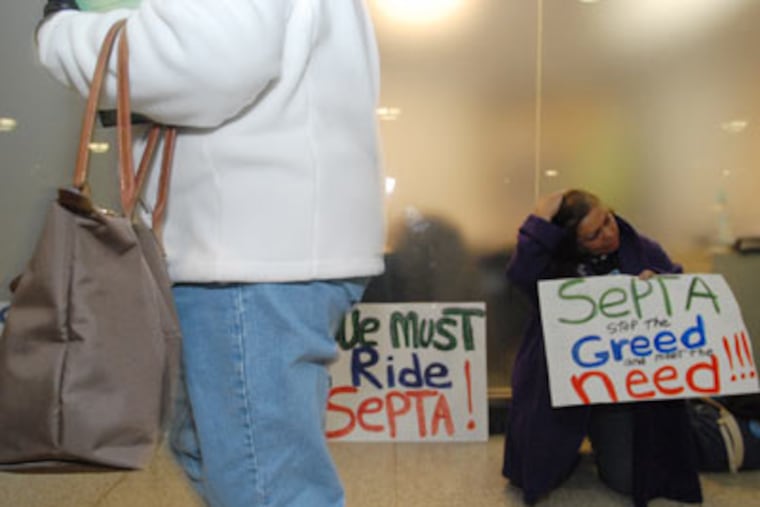TWU: Binding arbitration would end SEPTA strike
The transit workers union tonight offered to end its four-day-old strike and return to work immediately if SEPTA accepted binding arbitration on the divisive issues of wages and pensions.

The transit workers union tonight offered to end its four-day-old strike and return to work immediately if SEPTA accepted binding arbitration on the divisive issues of wages and pensions.
SEPTA did not have an immediate response to the proposal, suggested by council members Bill Green and Curtis Jones.
If SEPTA declines, Transport Workers Union Local 234 president Willie Brown said, "we're in for a long strike."
Green acknowledged the arbitration proposal might be a long shot, but said "we're trying to come up with ways to get this resolved and let people get to and from work."
Earlier in the day, hopes for an early end to the transit strike had dwindled, as efforts by Gov. Rendell and U.S. Rep. Bob Brady to broker a settlement failed.
So the region's first work week without buses, subways or trolleys ended as it had begun, with commuters and students clambering onto overcrowded Regional Rail trains, driving into traffic jams, and walking or riding bicycles.
At 5:30 p.m., Suburban Station was a place of lengthening lines and fraying nerves. Still, conditions had improved over the chaos that occurred in the first hours of the strike.
"Tighten up, tighten up!" SEPTA workers called to waiting commuters, hoping to shorten the lines that snaked through the concourse. Commuters were not allowed on the platform until their trains had arrived, instead organized in lanes designated by plastic yellow chains.
"Am I going the right way for the R7?" a woman called out.
She was.
"I waited two hours yesterday," said Joe Doughtery, 45, in line to board an R3 train this evening. "I get on the train and it's half empty."
By 6 p.m. Center City traffic had slowed to an excruciating crawl. Drivers were left stuck and steaming as skateboarders and bicyclists were the only things moved.
A trip from Broad and Callowhill Streets to 30th Street Station that usually would take 10 minutes took an hour. There was no such thing as an alternative route.
At least the Center City train stations were heated. Commuters waiting for trains at the Fern Rock Transportation Center in North Philadelphia had to brave the frigid evening.
The strike has added two-and-a-half hours to Marvetta Wright's daily back-and-forth between Olney and her home in Southwest Philadelphia.
"When they go out, we gotta pay for it, and it's not fair," said Wright, 35, a home health care provider.
"I hate it. I'm disgusted with it," she said. "And it's becoming cold."
When asked if she blamed the union or management for the strike, she paused.
"I just want to go home and be with my children," she pleaded
Michelle Walter, 36, a physician's assistant at Albert Einstein Medical Center was waiting for a train to take her home to Center City.
"In the morning it's not so bad. But at night it's a little sketchy," she said of the neighborhood between the hospital and the train station. So on top of paying double for her fare - she usually rides the subway - she sometimes has to pay for a cab to make it safely to Fern Rock.
Before the strike, she was happy with SEPTA, but now, "I'm annoyed, I think they're being a little greedy," she said of the union.
As riders arrived at Fern Rock some had family or friends waiting in cars while others had to trudge off into the night.
Several women commuters passed strikers who had two barbecue grills fired up and a TV tuned to the news.
One woman asked the strikers why they had the TV.
"Got a TV to know what's going on," replied a man who would only say he was a SEPTA cashier. "Need to know if we're going to work or not."
After some polite conversation, a car arrived for the women. One joked about coming back later to hang out with the strikers.
"Have a nice weekend ladies," the cashier said. "Sorry for the inconvenience."